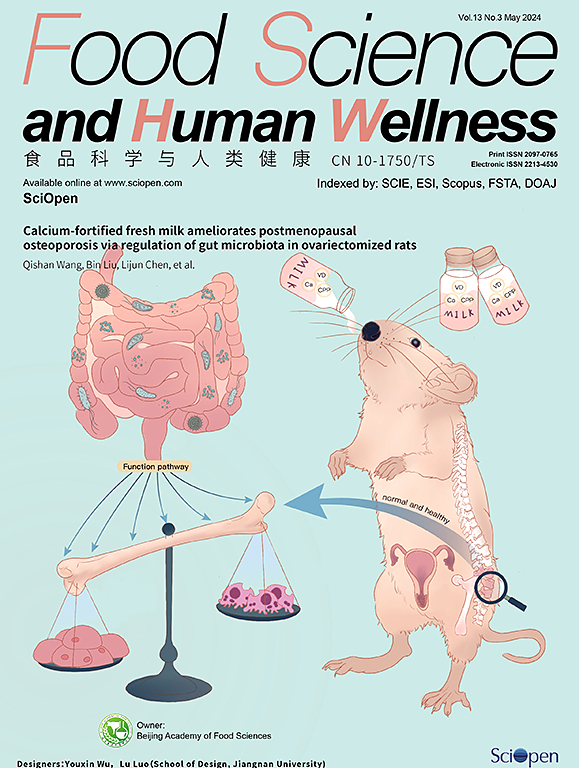甘薯品种中的高β-谷甾醇-D-葡萄糖苷含量及其通过多种转移相关信号抗乳腺癌的潜力
IF 7.4
1区 农林科学
Q1 FOOD SCIENCE & TECHNOLOGY
引用次数: 0
摘要
β-谷甾醇-D-葡萄糖苷(β-SDG)是一种植物甾醇化合物,其抗肿瘤活性已被先前的研究证实。然而,其对乳腺癌的抑制作用仍不明确。为此,我们从甘薯中分离出了β-SDG,并利用蛋白质组分析研究了其抑制乳腺癌的机制。我们从36个甘薯品种中选出了β-SDG含量较高的甘薯品种S6,并通过高效液相色谱法分离了β-SDG。随后,建立了乳腺癌原位动物模型,β-SDG能显著减少MCF-7异种移植小鼠的肿瘤体积。肿瘤组织的蛋白质组学分析表明,其中127种蛋白质上调,80种蛋白质下调。基因本体和网络分析显示,调控蛋白主要与上皮-间质转化(EMT)、肌生成、胆固醇稳态、氧化磷酸化和活性氧通路相关,而Vimentin、NDUF、VDAC1、PPP2CA和SNX9是最重要的5个节点度基因。同时,体外和体内研究结果表明,作为EMT标志物的PPP2CA和Vimentin的蛋白表达参与了乳腺癌细胞的转移,并能被β-SDG逆转。这项研究强调了β-SDG作为甘薯中的一种生物活性化合物,以及β-SDG通过抑制转移来治疗乳腺癌的潜在疗效。本文章由计算机程序翻译,如有差异,请以英文原文为准。
High β-sitosterol-D-glucoside content in sweet potato varieties and its anti-breast cancer potential through multiple metastasis-associated signals
β-Sitosterol-D-glucoside (β-SDG) is a phytosterol compound whose antitumor activity has been confirmed by previous studies. However, its suppression on breast cancer remains unclear. To that purpose, we isolated β-SDG from sweet potato and investigated the breast-cancer-inhibiting mechanism using proteomic analysis. The sweet potato species S6 with high β-SDG content were chosen form 36 species and β-SDG was isolated by HPLC. Afterwards, an in situ animal model of breast cancer was established, and β-SDG significantly reduced the tumor volume of MCF-7 xenograft mice. Proteomic analysis of tumor tissues revealed that 127 of these proteins were upregulated and 80 were downregulated. Gene ontology and network analysis showed that regulatory proteins were mainly associated with epithelial-mesenchymal transition (EMT), myogenesis, cholesterol homeostasis, oxidative phosphorylation and reactive oxygen pathways, while Vimentin, NDUF, VDAC1, PPP2CA and SNX9 were the most significant 5 node degree genes. Meanwhile, in vitro and in vivo results showed that the protein expression of PPP2CA and Vimentin, which are markers of EMT, were involved in breast cancer cell metastasis and could be reversed by β-SDG. This work highlights β-SDG as a bioactive compound in sweet potato and the potential therapeutic effect of β-SDG for the treatment of breast cancer by inhibiting metastasis.
求助全文
通过发布文献求助,成功后即可免费获取论文全文。
去求助
来源期刊

Food Science and Human Wellness
Agricultural and Biological Sciences-Food Science
CiteScore
8.30
自引率
5.70%
发文量
80
审稿时长
28 days
期刊介绍:
Food Science and Human Wellness is an international peer-reviewed journal that provides a forum for the dissemination of the latest scientific results in food science, nutriology, immunology and cross-field research. Articles must present information that is novel, has high impact and interest, and is of high scientific quality. By their effort, it has been developed to promote the public awareness on diet, advocate healthy diet, reduce the harm caused by unreasonable dietary habit, and directs healthy food development for food industrial producers.
 求助内容:
求助内容: 应助结果提醒方式:
应助结果提醒方式:


